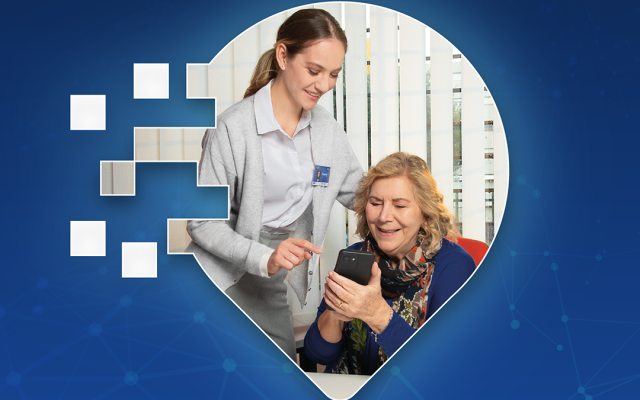For the 31st instalment of “Our School” Professors, we introduce you to Mauro Crepaldi, professor, author and learning designer.
Mauro teaches at a school in Rome and firmly believes in the teachers as mentors, and foremost of themselves. “Because we are directly involved in the discovery, analysis, study and design of learning tools and products, and the more we are involved, participate and drive this process, the better our classes will perform. A student who sees their teachers continue to learn, collaborate and develop ideas will have a better chance than others to find the direction and meaning to their activities at school. And this is one of the reasons that drove me to join “Our School.”
“This is not the first project I participate in with the Fondazione Mondo Digitale,” explains Mauro. “However, in this case, both the community and the digital dimension have had a significant impact on my teaching. Together with other professors, we are developing a course on water, a simple and yet multifaceted issue. Digital tools have allowed us to unite information, exploration, invention and reflection in a single didactic format, imagining activities that can also involve students emotionally, transporting them into a true sequential, virtual and interactive journey.
As usual, we share a short self-presentation video and then the interview with researcher Ilaria Gaudiello, who coordinates the works of the open source community of professors and educators.
INTERVIEW
Mauro, your profession is based on analysis, creativity, the careful observation of learning dynamics and the desire to transmit attitudes, knowledge, skills and values. The FMD knows you as a teacher, author, educator and designer. How do you use digital tools to unite the different facets of your work?
Rather than different facets, I would refer to different approaches to the same didactic construct. In this sense, digital tools are an immense operative facilitator that can be used to simply personalise learning for each individual students, to provide a class of students with the best conditions for health coopetition (competitive cooperation), to infinitely extend problem solving, to creatively aggregate content, to practically employ coding...
For students, digital tools allow us to exchange roles, turn boring and repetitive activities into ludic ones, learn to express oneself with current ways of speaking …
This means that apps have true applications and devices become authentic tools. Moreover, it gives programming a meaning and simple computers become cultural artefacts (not just technological ones) that drive the development of critical thinking and responsibility.
You have co-conceived and experimented a course for “Our School.” Can you tell us more about this collaborative experience?
Our idea was to take a simple and didactically exploited topic like water to create a modern, more enticing, interactive and creative narration. To achieve this, we employed immersive and augmented reality and developed a journey in which students move around a virtual 3D museum, like in a videogame, and interact with three-dimensional artefacts. In the process, they collect information and discoveries. They are invited to reflect on their personal, daily experience and major ecological issues.
We also drew inspiration from escape rooms. Students must recognise and select elements. Then, they must invent a solution to the issues that emerge during the course. Moreover, we presented the case of the international space station to address a closed water cycle.
The final product was proposed (I daresay tested) in our classrooms. Notwithstanding the social and cultural differences, as well the location and attendance at our schools, we all realized that there was a greater active and emotional involvement of students. Moreover, other transversal objectives were also achieved. In terms of didactic “return,” we would need a control group and a custom-tailored survey. Nonetheless, I am very satisfied.
How do you imagine “Our School” in a couple of years? What long-term initiatives would you like to see implemented?
I imagine that, in a couple of years, “Our School” will be very crowded. It’s a very dynamic, constructive and concrete environment in which colleagues with very different passions and didactic methodologies, ages and provenances, implement projects that produce great satisfaction to the teachers and allow students to have happy teachers and to enjoy school in a “Telemachusian” way. (In the Odyssey, Telemachus speaks to Athena about his father, whom he has never met. He asks her if he had been a happy man. For him it was asked in consolation; in my paraphrase, as a “right” of children/students).
On the contrary, however, I would be terrified by an “Our School” that were to crystallise its “educational vision” and no longer constantly update its didactic drive to address ongoing and emerging historical and social needs. In the short term, the level of functional and return illiteracy, the complete detachment from a scientific mentality, and the fragile polarisation of issues and arguments in our society make it extremely important to concentrate on the possibility/necessity of profoundly rethinking school courses. It is fundamental to work on mental elasticity (understood as the ability to change and recognise different points of view), understanding the underlying psychological dimensions of our “rational” decisions (the various “logical fallacies” that we all share as human beings), the need to respect a new role for parents/teachers and the need to reinstate a subject (another?) that I personally believe is fundamental: rhetoric.
What readings would you recommend for the community?
I would like some advice myself on finding time to read! In any case, I would recommend three books that I have found very useful at school. The first is “Speaking Together” by Friedemann Shulz Von Thun. It helps us to understand the enormous power and responsibility that, as teachers, we have in addressing our students and providing them with feedback that we may not always adequately control – or worse, if we do not fully understand an issue. Then, a reading to help us interact with school administrations when we need to “ask” for things. Not everyone enjoys it, but I found Paolo Borzachiello’s “Parole per Vendere” both simple and practical. Finally, in order to solve complicated issues and launch messages to our classes, I found the art of creating metaphors described in Consuelo C. Casula’s “Giardinieri Principesse Porcospini” phenomenal.



